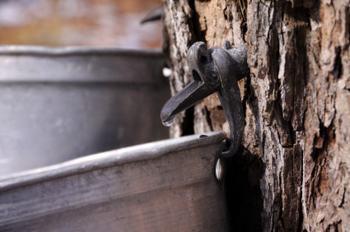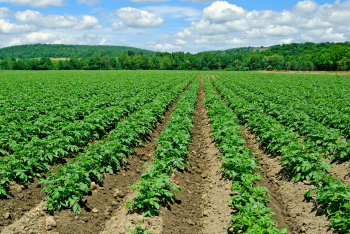Effects of Climate Change on Organisms
![]() Institution: University of Maine
Institution: University of Maine
Sponsor: National Science Foundation through the Sustainability Solutions Initiative
Global warming is expected to have a profound effect on Maine’s climate in the coming decades, potentially affecting human health and triggering significant changes and geographic shifts in the state’s agriculture, forests, and wildlife. Could a warmer future spell the end of pines in the Pine Tree State, along with such iconic and important species as maple trees and moose?
Brian McGill, Associate Professor of Ecological Modeling at UMaine’s School of Biology and Ecology and the Sustainability Solutions Initiative, is leading an SSI team that aims to address diverse stakeholders’ questions about the effects of climate change on these and other key organisms in Maine in order to help stakeholders better plan for the future.
Why This Project?
 Current projections predict that Maine will be 8.1 degrees warmer by 2080, with the warming concentrated in winters. Warming temperatures may trigger changes including an increase in insect-borne diseases, the northward spread of forest and crop pests formerly limited by the cold, and range changes in some of Maine’s tree species and wildlife. Consequences include a higher incidence of tick- and mosquito-borne illnesses such as Lyme disease and equine encephalitis and infestations of forest pests such as the hemlock wooly adelgid. In addition, a warmer climate can make potatoes more vulnerable to disease; affect white pines, maple trees, and maple syrup production; and possibly transform Maine’s northern forests from predominantly spruce and fir to hardwoods. Finally, as temperatures rise, mammals such as moose could shift ranges up to 500 miles northward, based on paleontological data.
Current projections predict that Maine will be 8.1 degrees warmer by 2080, with the warming concentrated in winters. Warming temperatures may trigger changes including an increase in insect-borne diseases, the northward spread of forest and crop pests formerly limited by the cold, and range changes in some of Maine’s tree species and wildlife. Consequences include a higher incidence of tick- and mosquito-borne illnesses such as Lyme disease and equine encephalitis and infestations of forest pests such as the hemlock wooly adelgid. In addition, a warmer climate can make potatoes more vulnerable to disease; affect white pines, maple trees, and maple syrup production; and possibly transform Maine’s northern forests from predominantly spruce and fir to hardwoods. Finally, as temperatures rise, mammals such as moose could shift ranges up to 500 miles northward, based on paleontological data.
In addition to affecting human health, such changes could have an impact on forestry, agriculture, tourism, and other important drivers of the state’s economy. Maine’s universities and colleges have the capacity to conduct research to help health care organizations, agricultural interests, policy makers, land managers, and other groups better anticipate and plan for climate change, but no opportunities have existed for these diverse stakeholders to meet with each other and researchers to identify their priority concerns. At the same time, climate change is a notoriously polarized and politicized issue.
Connecting Knowledge with Action
 The SSI team has organized a workshop with more than 15 stakeholders, including disease specialists, foresters, park managers, state wildlife managers, conservation organizations, and representatives from the tourism and outdoor recreation industries to identify their primary questions about climate change.
The SSI team has organized a workshop with more than 15 stakeholders, including disease specialists, foresters, park managers, state wildlife managers, conservation organizations, and representatives from the tourism and outdoor recreation industries to identify their primary questions about climate change.
Based on these findings, McGill’s team will conduct research responding to stakeholders’ priority questions. In addition to building computer models that explore the role of land-use change on climate driven migrations, the researchers will use a variety of methods to address stakeholders’ information needs. These methods may include statistical computer modeling to show projected range shifts in organisms of concern, agricultural physiological modeling to predict crop and pest responses to climate change, and common garden experiments to investigate the effects of warming on plant health and pollinators.
The researchers will collaborate with stakeholders to interpret and evaluate results and present findings to a broader public audience. They also will evaluate the effectiveness of this approach and share their findings through journal articles, conference presentations, and other venues. Ultimately, their findings will provide stakeholders with new tools and resources to help guide decision-making in preparing for climate change. At the same time, this research will help advance the field of sustainability science by determining best practices for performing scientific research that meets societal needs and engages stakeholders in ways that help ensure that findings are credible, relevant, and valid.
Team Members
- Brian McGill, School of Biology & Ecology, SSI (team leader)
- Frank Drummond, School of Biology & Ecology
- Malcolm Hunter, Wildlife Ecology, Civil Engineering
- Shaleen Jain, Civil & Environmental Engineering
- Brian Olsen, School of Biology & Ecology
- Tim Waring, School of Economics
Post-doctoral Fellow
- Christine LaManna, Sustainability Solutions Initiative
Resources
- News: Changing Climate Could Affect State’s Maple Syrup Production
- News: Blogging Sustainability – Brian McGill Spreads the Word About Policy Relevant Science
- Media: Grad Student Jenny Shrum’s Maple Syrup Research Attracts National Media Attention
- Media: UMaine grad student researching effects of weather, climate change on maple sugaring industry (Huffington Post)
Supported by National Science Foundation award EPS-0904155 to Maine EPSCoR at the University of Maine.
